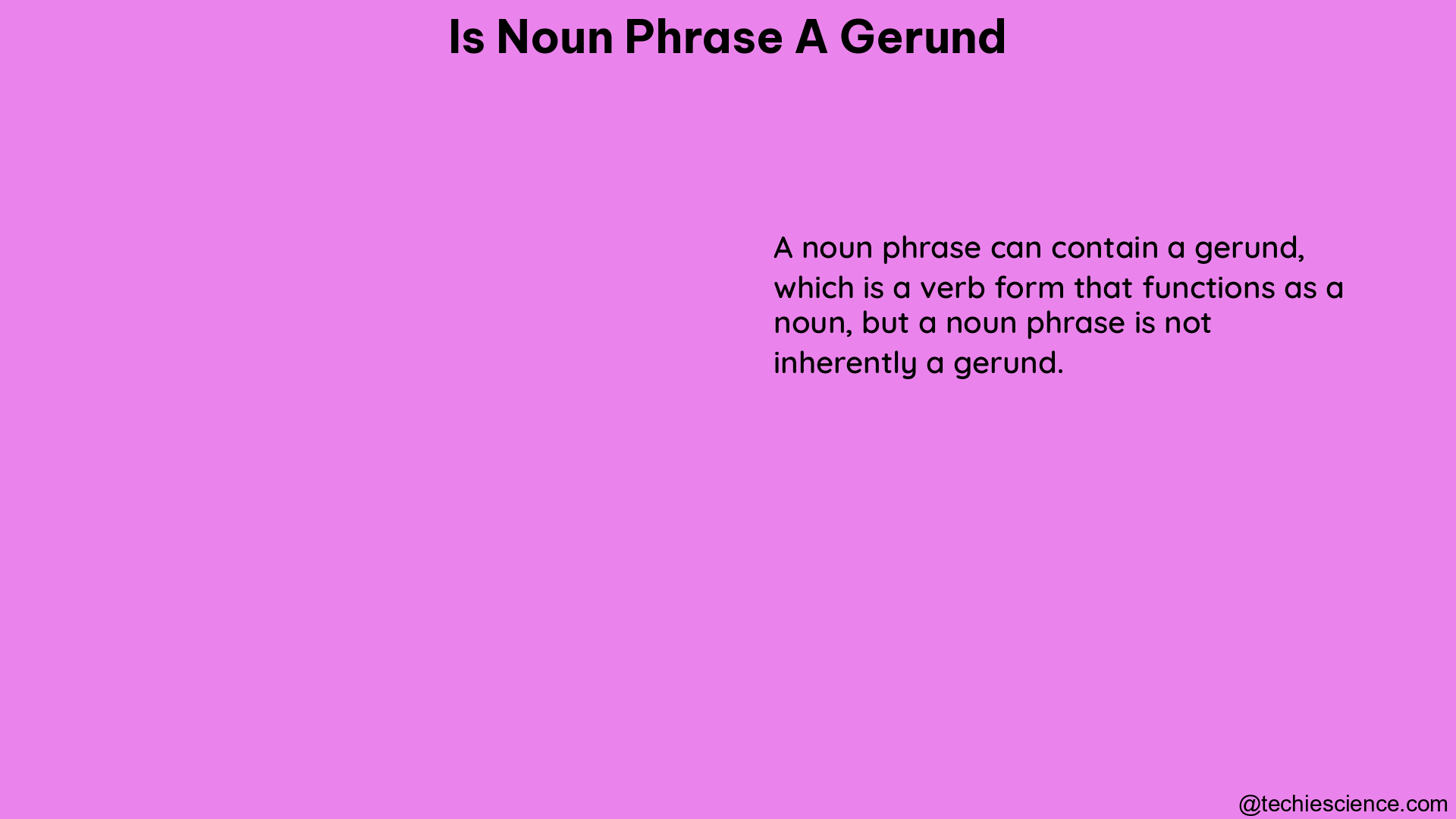A noun phrase and a gerund phrase are distinct grammatical constructs in the English language. While both function as nouns within a sentence, they have unique characteristics and formations. In this comprehensive guide, we will delve into the intricacies of noun phrases and gerund phrases, exploring their differences and providing a thorough understanding of these essential grammatical concepts.
Understanding Noun Phrases
A noun phrase is a group of words that functions as a noun within a sentence. It typically consists of a noun or pronoun, along with any associated modifiers, determiners, or complements. Noun phrases can serve various roles, such as subjects, objects, or complements, and they provide a way to express complex ideas using a single grammatical unit.
Characteristics of Noun Phrases
- Noun or Pronoun as the Head: The core of a noun phrase is a noun or pronoun, which serves as the head of the phrase.
- Modifiers and Determiners: Noun phrases can include adjectives, articles, possessives, and other modifiers that provide additional information about the noun or pronoun.
- Complexity: Noun phrases can range from simple (e.g., “the book”) to more complex (e.g., “the large, hardcover book on the shelf”).
- Grammatical Functions: Noun phrases can function as subjects, objects, complements, or other parts of speech within a sentence.
Examples of Noun Phrases
- “The big dog” (subject)
- “My favorite book” (object)
- “A person with a kind heart” (complement)
- “The house on the hill” (prepositional phrase)
Understanding Gerund Phrases

A gerund phrase is a phrase that consists of a gerund (a verb form ending in “-ing” that functions as a noun) and any associated modifiers, objects, or complements. Gerund phrases act as nouns within a sentence and can serve various grammatical roles.
Characteristics of Gerund Phrases
- Gerund as the Head: The core of a gerund phrase is a gerund, which is a verb form that functions as a noun.
- Modifiers and Complements: Gerund phrases can include adverbs, objects, or other modifiers that provide additional information about the gerund.
- Grammatical Functions: Gerund phrases can function as subjects, objects, objects of prepositions, or predicate nominatives within a sentence.
Examples of Gerund Phrases
- “Singing in the shower” (subject)
- “Enjoying the sunset” (object)
- “Interested in learning a new language” (object of preposition)
- “Her hobby is gardening” (predicate nominative)
Key Differences between Noun Phrases and Gerund Phrases
- Formation: Noun phrases are formed around a noun or pronoun, while gerund phrases are formed by adding the “-ing” suffix to a verb.
- Verb-like Quality: Gerund phrases often have a more dynamic, verb-like quality due to their origin from verbs, whereas noun phrases are more static in nature.
- Grammatical Functions: Both noun phrases and gerund phrases can function as nouns, but they may serve different grammatical roles within a sentence.
Identifying Noun Phrases and Gerund Phrases
To identify a noun phrase, look for a noun or pronoun as the core of the phrase, along with any associated modifiers, determiners, or complements. To identify a gerund phrase, look for a verb form ending in “-ing” that is functioning as a noun, along with any related modifiers, objects, or complements.
Here are some examples to help you distinguish between noun phrases and gerund phrases:
Noun Phrases:
– “The beautiful sunset”
– “My favorite book”
– “A person with a kind heart”
Gerund Phrases:
– “Singing in the shower”
– “Enjoying the sunset”
– “Interested in learning a new language”
Practical Applications and Considerations
Understanding the differences between noun phrases and gerund phrases is crucial for effective communication and accurate writing in English. Proper usage of these grammatical constructs can enhance the clarity and precision of your language, whether in academic, professional, or personal contexts.
Additionally, recognizing the distinctions between noun phrases and gerund phrases can be particularly helpful in the following scenarios:
- Language Instruction: Educators teaching English grammar can use the understanding of noun phrases and gerund phrases to help students develop a deeper grasp of sentence structure and language mechanics.
- Editing and Proofreading: Editors and proofreaders can identify and correct any misuse or confusion between noun phrases and gerund phrases, ensuring the overall quality and coherence of written work.
- Second Language Acquisition: Learners of English as a second language can benefit from a clear understanding of the differences between noun phrases and gerund phrases, which can aid in their language proficiency and accurate usage.
Conclusion
In summary, while noun phrases and gerund phrases both function as nouns within a sentence, they are distinct grammatical constructs with unique characteristics and formations. By understanding the differences between these two concepts, you can enhance your command of the English language, improve your written and spoken communication, and navigate the nuances of grammar with greater confidence.
References
- Nagelhout, E. (n.d.). Gerund Phrases. University of Nevada, Las Vegas. Retrieved from https://nagelhout.faculty.unlv.edu/AGiC/s5j.html
- Ginger Software. (n.d.). Gerund Phrase: Definition and Examples. Retrieved from https://www.gingersoftware.com/content/grammar-rules/gerund-phrase
- Grammarly. (2022, May 25). What Is a Gerund Phrase? Retrieved from https://www.grammarly.com/blog/gerund-phrase/
- Langeek. (n.d.). Gerund Phrases. Retrieved from https://langeek.co/en/grammar/course/686/gerund-phrases
- Amazing Talker. (2022, April 26). Gerund Phrases: Definition, Examples, and Usage. Retrieved from https://en.amazingtalker.com/blog/en/english/68516/

Hi, I am Srishti Mukherjee. I have completed my M.A. in English.
I always like to explore new zones in the field of English Literature
Apart from this, I like to read Novels and watch movies.